I am probably the millionth blogger to comment on Major Hasan’s alleged massacre of 13 people at Fort Hood, Texas, and I’m sure it won’t stop there. I have to say, though, that the rhetoric I’ve been hearing over the past week has made it impossible for me not to toss my screed  onto the growing pile. Commentators pretty much across the mainstream spectrum of opinion have latched onto this idea that Hasan was given the chance to do this heinous act by virtue of a culture of “political correctness” within the military, i.e. the Army being over-sensitive to Muslims within their ranks and overlooking Hasan’s failings. This strikes me as wildly off the mark and – worse – an attempt to utilize an unspeakable act of murder to make political points. It’s also part of the very common practice of mainstream commentators to avoid the elephant in the room when discussing matters related to our two simultaneous wars; namely, the true costs of such extended conflicts on those who fight in them, and the unwillingness of so many of the rest of us to share that burden in any meaningful sense.
onto the growing pile. Commentators pretty much across the mainstream spectrum of opinion have latched onto this idea that Hasan was given the chance to do this heinous act by virtue of a culture of “political correctness” within the military, i.e. the Army being over-sensitive to Muslims within their ranks and overlooking Hasan’s failings. This strikes me as wildly off the mark and – worse – an attempt to utilize an unspeakable act of murder to make political points. It’s also part of the very common practice of mainstream commentators to avoid the elephant in the room when discussing matters related to our two simultaneous wars; namely, the true costs of such extended conflicts on those who fight in them, and the unwillingness of so many of the rest of us to share that burden in any meaningful sense.
One point few will disagree with – Hasan is a nut job who could have done a lot of things other than shoot up a roomful of people to express his rage. And his superiors obviously ignored many warning signs. But I think there’s a better explanation for this than “political correctness”, and it’s (wait for it): resourcing a major overseas deployment without conscription. They need trained professionals, and they sure as hell can’t draft them, so they take what they can get, even if they are severely incompetent. And homicidal maniacs? Who knows… perhaps they get waved through, as well. We are sending them over to kill people, among other things. But in a nation run by politicians who would rather bankrupt us all than institute something as deeply unpopular as a military draft, the military must take the bad with the good in order to fulfill the demands of our seemingly endless wars. And even then, we’re talking about multiple deployments (some brigades on their fifth), reservists tapped, national guard troops sent overseas, the works.
 So here’s this army psychologist tasked with counseling soldiers returning from Iraq and Afghanistan – individuals who are having severe problems, no doubt. They are coming back from Iraq with stories of the kind heard in detail during the Winter Soldier hearings of a couple of years ago – telling them to a devout Muslim with fundamentalist leanings. This Major Hasan has a skinful of this stuff and is taking abuse about being a Muslim himself. He is told he is to be shipped overseas for the first time and is working on getting himself out of the military entirely. Like so many instances in the modern military, this was another atrocity-producing situation in the making. But the fact that this very screwed-up guy got as far as he did speaks volumes about how thinly stretched our armed forces are, particularly with 120,000 troops still in Iraq and major influxes planned for Afghanistan (it appears).
So here’s this army psychologist tasked with counseling soldiers returning from Iraq and Afghanistan – individuals who are having severe problems, no doubt. They are coming back from Iraq with stories of the kind heard in detail during the Winter Soldier hearings of a couple of years ago – telling them to a devout Muslim with fundamentalist leanings. This Major Hasan has a skinful of this stuff and is taking abuse about being a Muslim himself. He is told he is to be shipped overseas for the first time and is working on getting himself out of the military entirely. Like so many instances in the modern military, this was another atrocity-producing situation in the making. But the fact that this very screwed-up guy got as far as he did speaks volumes about how thinly stretched our armed forces are, particularly with 120,000 troops still in Iraq and major influxes planned for Afghanistan (it appears).
Not to worry, America – Joe Lieberman is going to investigate. Civilization is saved. I’m sure we can rely on him to get to the bottom of this issue, in a manner of speaking.
luv u,
jp

 changing the terms of my credit agreement. In essence, they said they were raising the interest rate on my card to 23%. Yes, that’s right – 23% on a balance well below my credit limit, on a card I’ve had for at least a decade without missing a payment. You don’t seem surprised. Perhaps they’ve done the same to you… and, in fact, they are doing the same to everyone, as far as I know. It seems CitiGroup, the recipient of $45 billion in publicly funded bailout dollars, has settled on a business model that empties the pockets of American taxpayers a second time. Charging 23% and more on credit in an economic environment such as this, when people are losing their jobs, their homes, their shoes, for chrissake… and when institutions like Citi are drawing money from the Federal Reserve lending window at 0% to 0.25% interest. So… I guess when they’re earning less than 20% on your ass, you’re considered a non-performing asset.
changing the terms of my credit agreement. In essence, they said they were raising the interest rate on my card to 23%. Yes, that’s right – 23% on a balance well below my credit limit, on a card I’ve had for at least a decade without missing a payment. You don’t seem surprised. Perhaps they’ve done the same to you… and, in fact, they are doing the same to everyone, as far as I know. It seems CitiGroup, the recipient of $45 billion in publicly funded bailout dollars, has settled on a business model that empties the pockets of American taxpayers a second time. Charging 23% and more on credit in an economic environment such as this, when people are losing their jobs, their homes, their shoes, for chrissake… and when institutions like Citi are drawing money from the Federal Reserve lending window at 0% to 0.25% interest. So… I guess when they’re earning less than 20% on your ass, you’re considered a non-performing asset.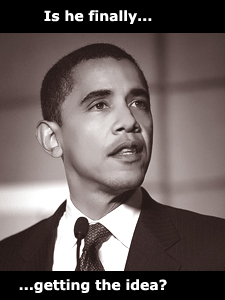 Of course, it goes beyond that. The banking sector is making life impossible for people’s employers, as well. It’s making it hard to get credit for capital expansion. It’s tightening up on educational loans, scrutinizing the financial profile of colleges and universities to a more stringent degree than even the Department of Education uses. It’s lobbying hard against its own regulation, particularly the proposed Consumer Protection agency. So it seems like we need to severely limit these people’s ambitions, instead of acting as though everything is still the way it was three or four years ago when nothing could ever go wrong, ever. Meanwhile, there seems to be no limit on the amount of money we can borrow to burn pointlessly (and, in fact, profoundly counterproductively) in Iraq and Afghanistan, year after year. It almost seems as though Obama is beginning to see the handwriting on the wall with respect to the latter war. I wonder when he’ll see it with respect to these rapacious financial institutions.
Of course, it goes beyond that. The banking sector is making life impossible for people’s employers, as well. It’s making it hard to get credit for capital expansion. It’s tightening up on educational loans, scrutinizing the financial profile of colleges and universities to a more stringent degree than even the Department of Education uses. It’s lobbying hard against its own regulation, particularly the proposed Consumer Protection agency. So it seems like we need to severely limit these people’s ambitions, instead of acting as though everything is still the way it was three or four years ago when nothing could ever go wrong, ever. Meanwhile, there seems to be no limit on the amount of money we can borrow to burn pointlessly (and, in fact, profoundly counterproductively) in Iraq and Afghanistan, year after year. It almost seems as though Obama is beginning to see the handwriting on the wall with respect to the latter war. I wonder when he’ll see it with respect to these rapacious financial institutions.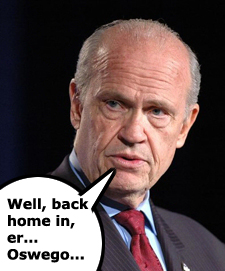 Long time Republican Congressman John McHugh was tapped by Obama to be Army Secretary, opening up a special election to replace him. Instead of being in essence a regional race for a national office, this became a clusterfuck grudge match between two wings of the Republican Party – the moderate-conservative and the lunatic-conservative. And the actual fighting took place not so much between office holders in the G.O.P., but among retirees, resignees, also-rans, and professional bloviators like Sarah Palin, Fred Thompson, Newt Gingrich, George Pataki, Rush Limbaugh, Dick Army, and so on. The G.O.P.’s-nominated candidate was apparently not conservative enough to please these… these…. objects, so they inserted themselves into a district of which they have no knowledge, to which have no connection, and in whose welfare they have no interest, just to score a point for their brand of reactionary politics. They supported the Conservative party nominee, pumped money into the race, and packed the airwaves with their endorsement messages and attack ads. And, well… they lost.
Long time Republican Congressman John McHugh was tapped by Obama to be Army Secretary, opening up a special election to replace him. Instead of being in essence a regional race for a national office, this became a clusterfuck grudge match between two wings of the Republican Party – the moderate-conservative and the lunatic-conservative. And the actual fighting took place not so much between office holders in the G.O.P., but among retirees, resignees, also-rans, and professional bloviators like Sarah Palin, Fred Thompson, Newt Gingrich, George Pataki, Rush Limbaugh, Dick Army, and so on. The G.O.P.’s-nominated candidate was apparently not conservative enough to please these… these…. objects, so they inserted themselves into a district of which they have no knowledge, to which have no connection, and in whose welfare they have no interest, just to score a point for their brand of reactionary politics. They supported the Conservative party nominee, pumped money into the race, and packed the airwaves with their endorsement messages and attack ads. And, well… they lost.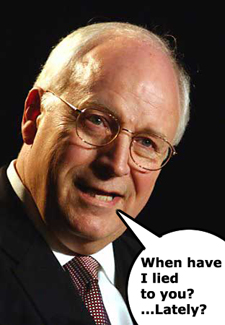 lesser extent, the Democrats poured millions into influencing the outcome of the race for a then-open seat. (We even got a visit by then-Vice President Dick Cheney, endorsing the Republican. Not sure it helped much.) It’s the kind of thing that makes campaign finance reform seem a more urgent matter than either party is willing to admit. In that kind of atmosphere, it takes real effort to discern the actual political positions of the various candidates. Much of the advertising is intended to discourage people from voting, rather than changing their minds. I am a registered Democrat and received stacks of direct mail from the Republican Congressional Campaign Committee, all of them flailing away at now-Congressman Michael Arcuri, the Democrat, accusing him of pretty much everything short of the Kennedy Assassination. None of it stood up to the most cursory review, but who has time to do research, right? Again… very cynical.
lesser extent, the Democrats poured millions into influencing the outcome of the race for a then-open seat. (We even got a visit by then-Vice President Dick Cheney, endorsing the Republican. Not sure it helped much.) It’s the kind of thing that makes campaign finance reform seem a more urgent matter than either party is willing to admit. In that kind of atmosphere, it takes real effort to discern the actual political positions of the various candidates. Much of the advertising is intended to discourage people from voting, rather than changing their minds. I am a registered Democrat and received stacks of direct mail from the Republican Congressional Campaign Committee, all of them flailing away at now-Congressman Michael Arcuri, the Democrat, accusing him of pretty much everything short of the Kennedy Assassination. None of it stood up to the most cursory review, but who has time to do research, right? Again… very cynical.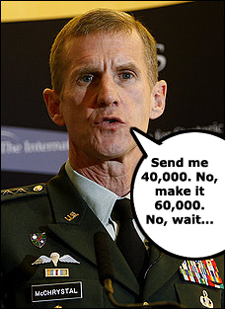 kind of success story. The truth is, that country is simply blowing up a bit more slowly than it was a couple of years ago. I suppose you could say that the success of counterinsurgency strategy was to help bring a full-scale fratricidal war down to 2003-04 levels of killing. That is a bit like an arsonist taking credit for helping to put out a house fire he himself started – one that resulted in multiple fatalities. (Note to our “leaders”: Don’t expect a good citizenship award any time soon… aside from the Nobel prize.) I must admit, I find the “the surge worked” crowd more than a little nauseating – most of them were in favor of this disastrous war in the first place. If Iraq is to be presented as a model for future interventions, I can see why the Iranians might want to be building bombs. We’ve, in essence, destroyed Iraq, killed perhaps a million people, permanently displaced several million more. Anyone want the same out there? Anyone?
kind of success story. The truth is, that country is simply blowing up a bit more slowly than it was a couple of years ago. I suppose you could say that the success of counterinsurgency strategy was to help bring a full-scale fratricidal war down to 2003-04 levels of killing. That is a bit like an arsonist taking credit for helping to put out a house fire he himself started – one that resulted in multiple fatalities. (Note to our “leaders”: Don’t expect a good citizenship award any time soon… aside from the Nobel prize.) I must admit, I find the “the surge worked” crowd more than a little nauseating – most of them were in favor of this disastrous war in the first place. If Iraq is to be presented as a model for future interventions, I can see why the Iranians might want to be building bombs. We’ve, in essence, destroyed Iraq, killed perhaps a million people, permanently displaced several million more. Anyone want the same out there? Anyone?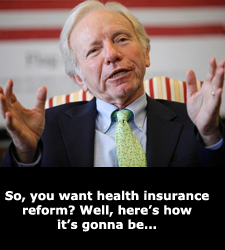 to “drive the Soviets out of Afghanistan” back in the 1980s and how we had, after that was over, turned away from that country and left it for the buzzards to fight over. (My words, not hers.) She might have mentioned that we had begun meddling in Afghanistan’s internal affairs prior to the Soviet invasion, and that that invasion was, in part, a response to the fanatical insurgency our intelligence agencies had helped to set in motion – you know, the one that later spawned the Taliban, Al Qaeda, and a few other organizations we’ve heard from more recently. International interventions of this kind have consequences, intended or not, that seldom redound to our benefit as a society (to say nothing of the peoples we subject to our policies).
to “drive the Soviets out of Afghanistan” back in the 1980s and how we had, after that was over, turned away from that country and left it for the buzzards to fight over. (My words, not hers.) She might have mentioned that we had begun meddling in Afghanistan’s internal affairs prior to the Soviet invasion, and that that invasion was, in part, a response to the fanatical insurgency our intelligence agencies had helped to set in motion – you know, the one that later spawned the Taliban, Al Qaeda, and a few other organizations we’ve heard from more recently. International interventions of this kind have consequences, intended or not, that seldom redound to our benefit as a society (to say nothing of the peoples we subject to our policies).  war and the fallacy of believing we can make America safe by continuing to occupy a foreign land. One would hope that Obama reads it – I have my doubts he’s hearing this point of view with any regularity. Bacevich observes that Obama is carrying forward the legacy of failure his predecessor established in both Afghanistan and Iraq, and while I don’t agree with every nuance of his analysis, he’s spot-on when questioning the general approach to the “War on Terror” that Bush took and which has since become a matter of conventional wisdom (or lack of same). The impetus towards revenge, stoked by the Bush team, that swept us into both wars has proven a dismal failure, as Bacevich points out. It is also a criminal abuse of power that has sowed the seeds of future disasters.
war and the fallacy of believing we can make America safe by continuing to occupy a foreign land. One would hope that Obama reads it – I have my doubts he’s hearing this point of view with any regularity. Bacevich observes that Obama is carrying forward the legacy of failure his predecessor established in both Afghanistan and Iraq, and while I don’t agree with every nuance of his analysis, he’s spot-on when questioning the general approach to the “War on Terror” that Bush took and which has since become a matter of conventional wisdom (or lack of same). The impetus towards revenge, stoked by the Bush team, that swept us into both wars has proven a dismal failure, as Bacevich points out. It is also a criminal abuse of power that has sowed the seeds of future disasters.  ourselves with some of the worst drug cartels in Mexico in the hope that they might someday voluntarily adopt at least the pretense of virtue as not to embarrass us any further. The objective is not good governance for the Afghans – it is denying Al Qaeda safe haven, and we seem willing to do anything to bring that about… including a lot of things that seriously undermine that very goal. Like support for figures like the warlord Dostum and his ilk who would, I’m sure, tolerate their former jihadist allies if they saw benefit in doing so. Like killing senior Taliban leaders, so that younger, more energetic, more zealous militants can take their places. Like sacrificing some of the best among us for an unworthy cause.
ourselves with some of the worst drug cartels in Mexico in the hope that they might someday voluntarily adopt at least the pretense of virtue as not to embarrass us any further. The objective is not good governance for the Afghans – it is denying Al Qaeda safe haven, and we seem willing to do anything to bring that about… including a lot of things that seriously undermine that very goal. Like support for figures like the warlord Dostum and his ilk who would, I’m sure, tolerate their former jihadist allies if they saw benefit in doing so. Like killing senior Taliban leaders, so that younger, more energetic, more zealous militants can take their places. Like sacrificing some of the best among us for an unworthy cause. such a hopeless legislative clusterfuck as the Baucus bill. Maybe it’s our recent experience with the topic of global warming that nudges me in that direction. Think of it – a few short years ago our leaders were disputing the science of climate change with some confidence. Now that skepticism is the province of the tin hat patrol and the policy debate is over how much (or how little) to do about the problem. Too little, too late? We did lose precious years during the Clinton and Bush administrations (particularly the latter) when fundamental changes might have been set in motion, but were stonewalled. Those changes will come harder now, and perhaps to insufficient effect. Nonetheless, there was a kind of sea change in 2007 and I suppose something like that could happen with health care in America. If we could all recognize the existence of the problem and its fundamental nature, that would be a big step forward.
such a hopeless legislative clusterfuck as the Baucus bill. Maybe it’s our recent experience with the topic of global warming that nudges me in that direction. Think of it – a few short years ago our leaders were disputing the science of climate change with some confidence. Now that skepticism is the province of the tin hat patrol and the policy debate is over how much (or how little) to do about the problem. Too little, too late? We did lose precious years during the Clinton and Bush administrations (particularly the latter) when fundamental changes might have been set in motion, but were stonewalled. Those changes will come harder now, and perhaps to insufficient effect. Nonetheless, there was a kind of sea change in 2007 and I suppose something like that could happen with health care in America. If we could all recognize the existence of the problem and its fundamental nature, that would be a big step forward. compromising right-ward from there, as if the “magic of the marketplace” still holds a great deal of promise in the wake of last year’s economic meltdown. The rhetoric, by and large, has been anything but inspirational. A lot of talk about “bending the cost curve” – whoa, there’s something that will get the rank and file heated up. And yet, single payer is avoided by the liberals and used as an epithet by the right… even when it’s clear that it would be the most cost-effective means of providing health coverage. I’m convinced that the reason why there is so much talk about “choice” in this debate is to undermine the case for single payer… as if “choice” of health plans is the highest value one can imagine. I’m in the goddamned private market, and what choice do I have? One freaking plan that pays for anything. That’s it. And I’m among the luckiest. Seems to me we should concentrate more on giving people security. Seems like we should think of it more like we do about our fire departments or other life-saving services. It’s really about having that reliable resource, not choosing between competing vendors as a value in itself.
compromising right-ward from there, as if the “magic of the marketplace” still holds a great deal of promise in the wake of last year’s economic meltdown. The rhetoric, by and large, has been anything but inspirational. A lot of talk about “bending the cost curve” – whoa, there’s something that will get the rank and file heated up. And yet, single payer is avoided by the liberals and used as an epithet by the right… even when it’s clear that it would be the most cost-effective means of providing health coverage. I’m convinced that the reason why there is so much talk about “choice” in this debate is to undermine the case for single payer… as if “choice” of health plans is the highest value one can imagine. I’m in the goddamned private market, and what choice do I have? One freaking plan that pays for anything. That’s it. And I’m among the luckiest. Seems to me we should concentrate more on giving people security. Seems like we should think of it more like we do about our fire departments or other life-saving services. It’s really about having that reliable resource, not choosing between competing vendors as a value in itself. from the 9/11 attacks, lashing out at one utterly destroyed by decades of warfare, much of it stoked by our government (with the cooperation of Pakistan and Saudi Arabia). We are now told that the place is being overrun by religious fanatics – the Taliban – who want to bring the place back to the 13th century. From where it stands now, that wouldn’t be a very long trip.
from the 9/11 attacks, lashing out at one utterly destroyed by decades of warfare, much of it stoked by our government (with the cooperation of Pakistan and Saudi Arabia). We are now told that the place is being overrun by religious fanatics – the Taliban – who want to bring the place back to the 13th century. From where it stands now, that wouldn’t be a very long trip. Russians and, into the bargain, any thought of secularism in that country. When the Russians left, we lost interest and the place went even more profoundly to hell, descending into fratricidal war and chaos that made even the Taliban’s tenuous rule seem stable by comparison. But the one-eyed mullah and his pals, along with Sheikh Osama and his, were creatures of our own manipulative foreign policy.
Russians and, into the bargain, any thought of secularism in that country. When the Russians left, we lost interest and the place went even more profoundly to hell, descending into fratricidal war and chaos that made even the Taliban’s tenuous rule seem stable by comparison. But the one-eyed mullah and his pals, along with Sheikh Osama and his, were creatures of our own manipulative foreign policy. levels of uninsured – somewhere around 45 million people – they estimate the annual death toll of our profit-focused system at around 45,000 lives lost. Lack of insurance is now one of the most deadly medical conditions in this country, ahead of kidney disease in the number killed. That is to say nothing of the number sickened, disabled, and bankrupted in addition – many of the last category, I’m certain, immediate kin to the dead. I would imagine this would be shocking news anywhere else in the world. Here, it merits perhaps a brief reference on the evening news… then it’s time to move on. Yep, 45,000 dead from lack of health insurance. Man, that’s a lot of bodies, Ken! Up next, here’s Brad with tonight’s sports, then it’s over to Kristen for our weather forecast. Only in America.
levels of uninsured – somewhere around 45 million people – they estimate the annual death toll of our profit-focused system at around 45,000 lives lost. Lack of insurance is now one of the most deadly medical conditions in this country, ahead of kidney disease in the number killed. That is to say nothing of the number sickened, disabled, and bankrupted in addition – many of the last category, I’m certain, immediate kin to the dead. I would imagine this would be shocking news anywhere else in the world. Here, it merits perhaps a brief reference on the evening news… then it’s time to move on. Yep, 45,000 dead from lack of health insurance. Man, that’s a lot of bodies, Ken! Up next, here’s Brad with tonight’s sports, then it’s over to Kristen for our weather forecast. Only in America.  loss, and all the additional pain that proceeds from that, is occurring right now. Not as the consequence of some catastrophic terror attack, but of something much more easily prevented. To my mind, that makes this all the more insidious. We are allowing tens of thousands to die, hundreds of thousands to suffer, and millions to lose their shred of prosperity just to preserve the profitability of the health insurance industry. We are allowing a narrow segment of corporate shills to shut out the interests of our entire nation by preventing us from having the kind of public health system that every other industrialized nation enjoys. What the hell does that say about us? Much as I hate to channel Bob Dole, where is the fucking outrage?
loss, and all the additional pain that proceeds from that, is occurring right now. Not as the consequence of some catastrophic terror attack, but of something much more easily prevented. To my mind, that makes this all the more insidious. We are allowing tens of thousands to die, hundreds of thousands to suffer, and millions to lose their shred of prosperity just to preserve the profitability of the health insurance industry. We are allowing a narrow segment of corporate shills to shut out the interests of our entire nation by preventing us from having the kind of public health system that every other industrialized nation enjoys. What the hell does that say about us? Much as I hate to channel Bob Dole, where is the fucking outrage?  gathering is described as an expanded club of economic powers, there is one global economic power that is not on the guest list. Which one? To borrow a time-worn phrase, the workers of the world – all those folks in all those countries who make the whole thing run; workers that are paid, underpaid, and unpaid…. everyone from the office drone to the subsistence farmer to the domestic slave-spouse. The folks that carry all those wealthy people on their shoulders – they will be severely underrepresented in Pittsburgh, and with good reason. If they start informing global economic policy, well then…. that would be a different game altogether.
gathering is described as an expanded club of economic powers, there is one global economic power that is not on the guest list. Which one? To borrow a time-worn phrase, the workers of the world – all those folks in all those countries who make the whole thing run; workers that are paid, underpaid, and unpaid…. everyone from the office drone to the subsistence farmer to the domestic slave-spouse. The folks that carry all those wealthy people on their shoulders – they will be severely underrepresented in Pittsburgh, and with good reason. If they start informing global economic policy, well then…. that would be a different game altogether. over for dinner on the weekends. You’re always gambling on nothing going wrong, and something always does. If the car breaks down, you’re basically fucked – better luck next month. I had one credit card that kept me rolling for a few years – that was my rainy day, in essence. And I had no kids (cats, though). Can’t imagine what people do with dependents in a situation like that. What energy is left for organizing? I’m always amazed by the poor in countries like Haiti, where people have organized and faced down very powerful forces, decade after decade, setback after setback… and yet still they link arms and try again.
over for dinner on the weekends. You’re always gambling on nothing going wrong, and something always does. If the car breaks down, you’re basically fucked – better luck next month. I had one credit card that kept me rolling for a few years – that was my rainy day, in essence. And I had no kids (cats, though). Can’t imagine what people do with dependents in a situation like that. What energy is left for organizing? I’m always amazed by the poor in countries like Haiti, where people have organized and faced down very powerful forces, decade after decade, setback after setback… and yet still they link arms and try again.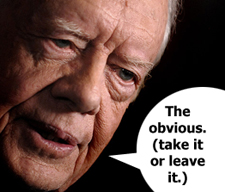 a factor in some of the more vitriolic opposition to Obama’s presidency. I would think that this might seem obvious to anyone who’s lived on this planet for more than five minutes and is not a member of the Glenn Beck army of morons. The specious claim about Obama’s non-U.S. birth, his secret life as a Muslim, his resemblance to Hitler or the “antichrist”, and similar bile is apparently rooted in the desire to portray the president as “the other”, the ultimate expression of which, in America, has always been the person of color. Of course, people from the center to the right are jumping all over Carter, accusing him of introducing race into this incredibly high-minded national conversation we’ve been having (ed. note: irony). As always, we’re all supposed to pretend that racism doesn’t exist, except for the black-on-white variety. Carter got the same for his observations on Palestine, which were pretty solid in my view, so I say good on him for sticking his neck out once again instead of resting on his Nobel laurels like most of his colleagues tend to do.
a factor in some of the more vitriolic opposition to Obama’s presidency. I would think that this might seem obvious to anyone who’s lived on this planet for more than five minutes and is not a member of the Glenn Beck army of morons. The specious claim about Obama’s non-U.S. birth, his secret life as a Muslim, his resemblance to Hitler or the “antichrist”, and similar bile is apparently rooted in the desire to portray the president as “the other”, the ultimate expression of which, in America, has always been the person of color. Of course, people from the center to the right are jumping all over Carter, accusing him of introducing race into this incredibly high-minded national conversation we’ve been having (ed. note: irony). As always, we’re all supposed to pretend that racism doesn’t exist, except for the black-on-white variety. Carter got the same for his observations on Palestine, which were pretty solid in my view, so I say good on him for sticking his neck out once again instead of resting on his Nobel laurels like most of his colleagues tend to do. when dealing with abysmally poor people. I’m not sure how they think a lot of inner city poor people manage to support themselves. Earth to Congress: there is an underground economy in America. It’s there because the overground one doesn’t work for the poor. Inner city counseling is not an easy job – it’s mostly triage. Still, I’m glad Congress is holding someone accountable for a change. I imagine next we will bar Halliburton from any federal contracts because their shoddy workmanship electrocuted 18 U.S. soldiers overseas. (Oh, wait – they got $30 million in bonuses.) Or that they’ll cut off Blackwater (now Xe) because they killed a bunch of folks in Nisour square in Baghdad (whoops – still working for us). Or that they’ll bar that firm guarding U.S. facilities in Afghanistan – the one manned by those dudes drinking gin off of each other’s asses. Or that they’ll take back all of the countless billions we gave to major banks and AIG because they were patently irresponsible in every imaginable way and nearly brought the financial system down.
when dealing with abysmally poor people. I’m not sure how they think a lot of inner city poor people manage to support themselves. Earth to Congress: there is an underground economy in America. It’s there because the overground one doesn’t work for the poor. Inner city counseling is not an easy job – it’s mostly triage. Still, I’m glad Congress is holding someone accountable for a change. I imagine next we will bar Halliburton from any federal contracts because their shoddy workmanship electrocuted 18 U.S. soldiers overseas. (Oh, wait – they got $30 million in bonuses.) Or that they’ll cut off Blackwater (now Xe) because they killed a bunch of folks in Nisour square in Baghdad (whoops – still working for us). Or that they’ll bar that firm guarding U.S. facilities in Afghanistan – the one manned by those dudes drinking gin off of each other’s asses. Or that they’ll take back all of the countless billions we gave to major banks and AIG because they were patently irresponsible in every imaginable way and nearly brought the financial system down.